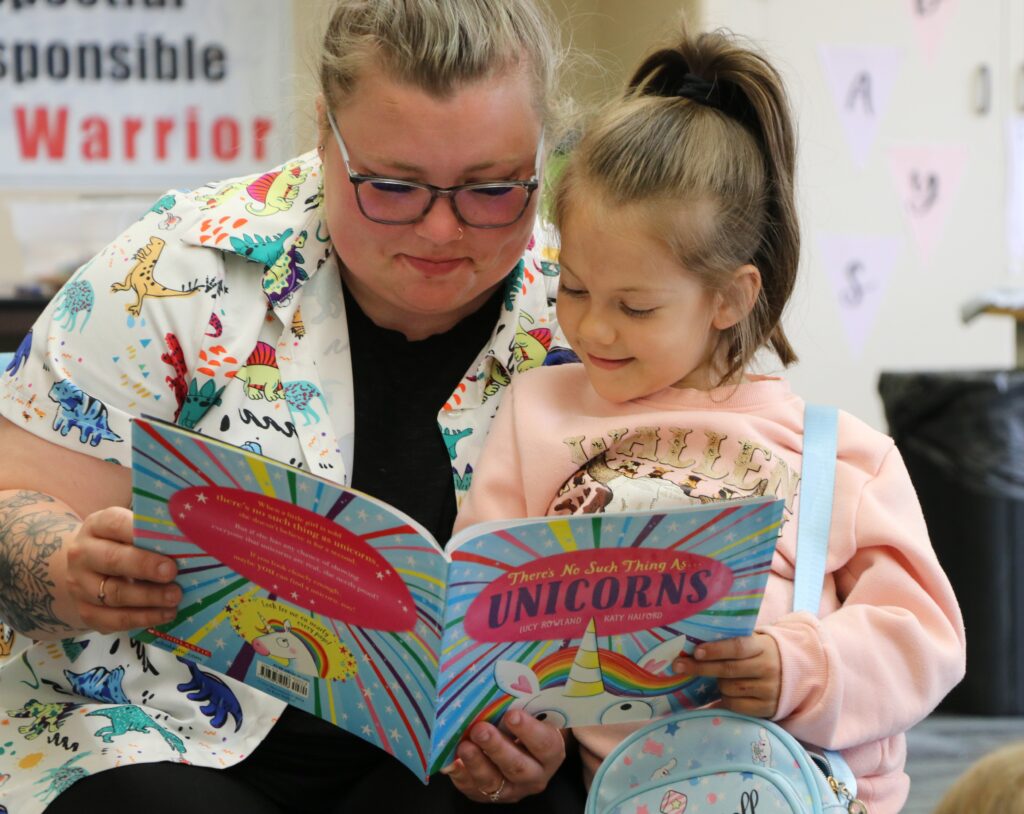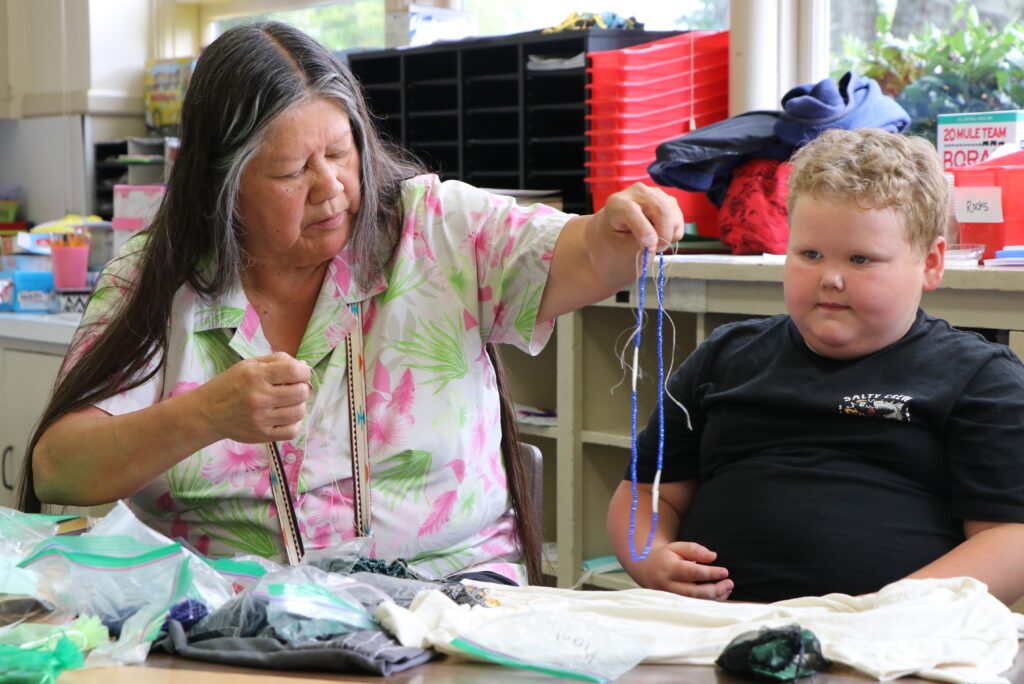
Ashley Allison, Siletz Valley School second grade teacher, reads to Jade Green, a first grader, during summer camp. (Photo by Jake Arnold, OSBA)
Siletz Valley School might call it “summer camp,” but they are sneaking in lots of learning, from literacy practice to regulating emotions to Tribal customs.
“We make it educational but also super, super fun,” said Vice Principal Kent Rilatos.
Siletz Valley’s nearly four weeks of summer instruction and activities were made possible by a grant from the Early Literacy Success Initiative passed in 2023. School districts around the state utilize such additional funds to create programs that can engage all students, closing learning gaps and reaching traditionally underserved populations.
House Bill 3198 (2023) created three grant programs to increase literacy support from birth through third grade. The Early Literacy Success School Grant is providing $90 million for the 2023-25 biennium that requires a 25% match from recipients. School districts and charter schools can use the money for teacher professional development, culturally relevant curricula and high-dosage tutoring and extended learning.
The Siletz Valley School, a Lincoln County School District charter school northeast of Newport, received an early literacy grant of more than $40,000 this year based on its enrollment of 239 students. With the additional money, Siletz Valley was able to expand its summer learning camp. It brought in more staff and teachers to create full summer days of activities with plenty of small group instruction and one-on-one intensive intervention for the elementary students.
The camp also has activities for older students, including high school credit recovery, paid for by other grants such as in the Student Success Act. The 2019 act, supported by OSBA, provides about $500 million a year through its Student Investment Account directly to school districts and charter schools to meet students’ behavioral and mental needs and to increase academic achievement.
“Too many students are not at the level of proficiency needed to advance on their educational journey, but our districts need additional resources to help them,” said Efren Zamudio, OSBA Legislative Services specialist.
Zamudio said a statewide campaign helps drive a focus on literacy but schools and districts need the flexibility to tailor their approaches to their communities.
Siletz Valley School leadership worked with staff and community members to devise a packed schedule of excursions and activities that also support core subjects, especially literacy. Siletz Valley’s Warrior Camp, named after the school mascot, will have two sessions, running June 19-28 and July 29-Aug. 9. The camp goes from 9 a.m. to 4 p.m. each day with an extra hour of child care before and after to accommodate working parents.
In the past, the district offered half days of summer school with only a handful of students attending. More than 50 students signed up for one or both sessions this year.
“The kids want to be here,” said third grade teacher Liz Guilford. “I want to be here too.”
The elementary school students do arts and crafts, play sports and go on field trips such as kayaking or visiting the Artsea Craftsea studio in nearby South Beach. At the same time, teachers are incorporating lessons and activities from Waterford, an early learning software program bought with the grant. The literacy development tool helps teachers individualize lessons to engage all students.
On a typical day, a teacher brought in her cat for students to visit, the littlest children did a yoga routine inspired by the movie “Frozen,” a parent came by for kickball at recess and everyone could play in the dirt while gardening.
Braydon Mikoleit, who will be in fifth grade, was torn between petting the cat and doing robotics on a recent day. He spent a few minutes with the cat and then raced back to the classroom for robotics.
Mikoleit gets excited about making his Lego creations move, but to make them work, he must know a long list of word commands and put them in order.
“It’s literacy but you have to meet them where they are at,” said first grade teacher Sloan Sharp.
The school worked hard to incorporate the community in the camp, asking people what they wanted and enlisting more than a half-dozen community members to help lead sessions. The school sits near Confederated Tribes of Siletz Indians land, and more than 70% of the students are Tribal members or live with Tribal members.
Culturally relevant learning is a big part of the camp, with activities such as drumming, dancing and Native American arts.
Marlene Stuart, a volunteer, is teaching students how to make traditional bead and shell necklaces. She said she has been giving such lessons for more than 50 years and is thrilled it is part of the school program.
“I think it is exciting that all the kids can learn,” she said.

Marlene Stuart, a Siletz Valley School summer camp volunteer, works with Uriah Johnson on a traditional necklace. Johnson, a second grader who is a Tribal member, said it feels special when he is learning Tribal lessons with his friends. (Photo by Jake Arnold, OSBA)
Reggie Butler Jr., a Tribal member who is a school board member, has helped with the drumming and taught kickball to the children. He said the camp is helping all the students, Native and non-Native, gain a better understanding about where they live.
“It’s good to see the kids coming together and getting a little more educated and having a good time at it,” he said.
Schools and districts must apply to the Oregon Department of Education for the Early Literacy Success grants and have their plans approved by their school boards. Angelica Cruz, ODE’s director of literacy, said Siletz Valley’s plan was notable for giving students opportunities to work on oral and written language skills in English and the Siletz Dee-ni langauge, including adding books that reflect students’ identities, home languages and cultures.
The school has also partnered with the Phoenix Wellness Center, a tribally owned counseling service, to provide lessons in emotional management and self-care. The students practice listening to each other in a talking circle, describing what they are feeling and asking for help.
Superintendent and Principal Ginger Redlinger said they will test the students in the fall to evaluate the camp’s effectiveness but they expect encouraging results. She said the students seem calmer and more focused during camp, fostering learning.
The early literacy grant has made it possible for the school to better serve the students who need the most support, she said.
“They are getting much more intense sessions,” Redlinger said. “We are seeing a big lift because of time with the teachers.”
– Jake Arnold, OSBA
[email protected]